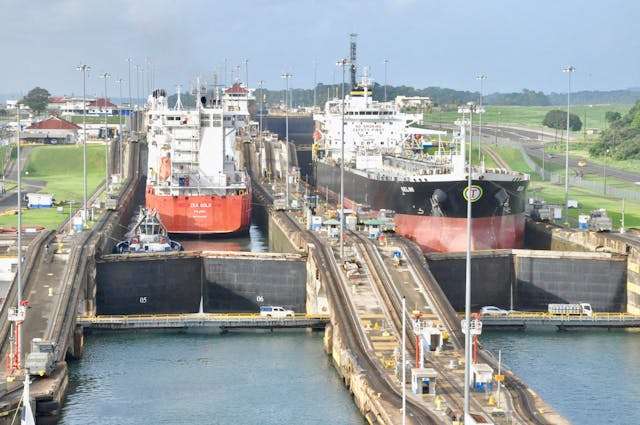Washington, D.C. – Former U.S. President Donald Trump has reignited a decades-old debate over Panama Canal ownership, declaring that the United States should reclaim control of the strategic waterway. His remarks, made during a recent political address, have sent shockwaves through diplomatic circles and raised concerns about U.S.-Panama relations.
Trump’s comments come amid growing tensions over China’s increasing involvement in Panama, particularly in its infrastructure projects near the canal. The former president’s stance has triggered a heated discussion over sovereignty, economic interests, and the potential for geopolitical conflicts in the region.
Trump’s Controversial Remarks on Panama Canal Ownership
In his speech, Trump referred to the 1999 handover of the Panama Canal to Panama as a “strategic mistake” and suggested that the U.S. should take back control of the waterway. He accused Panama of allowing Chinese investments to expand in the region, stating:
“We built it, we owned it, and we should never have given it away. Now, China is moving in, and we’re taking it back”.
Trump’s remarks align with his broader strategy of countering China’s growing global influence, particularly in Latin America. The canal, which serves as a vital link between the Atlantic and Pacific Oceans, is a key global trade route, with nearly 5% of the world’s maritime trade passing through it.
China’s Expanding Role in Panama
One of the central concerns driving Trump’s statements is China’s increasing presence in Panama. Over the years, Chinese state-owned enterprises have invested heavily in port infrastructure, logistics hubs, and energy projects near the canal. Beijing’s growing influence has sparked fears in Washington that China could leverage its economic ties to gain strategic control over the waterway.
The U.S. has long viewed Panama as a critical ally in the region, and Trump’s rhetoric suggests a potential shift in U.S. policy toward a more aggressive stance on Panama Canal ownership. American officials have warned that China’s involvement in Panama could pose national security risks, especially given the canal’s strategic importance for global commerce and military logistics.
Panama’s Response: Sovereignty at Stake
The Panamanian government has firmly rejected Trump’s statements, emphasizing that the canal’s ownership is non-negotiable. Panamanian President Laurentino Cortizo responded by stating:
“The Panama Canal is and will always remain under Panamanian control. We will not allow foreign powers to dictate our sovereignty”.

Since taking full control in 1999, Panama has managed the canal through the Panama Canal Authority (ACP), an autonomous government agency. The ACP has invested billions in canal expansion projects, modernized infrastructure, and improved efficiency, reinforcing its ability to maintain and operate the waterway independently.
Former Panamanian President José Rul Mulino also weighed in, calling Trump’s remarks “an insult to Panama’s independence.” He emphasized that the Torrijos-Carter Treaties, which facilitated the handover of the canal, were a historic milestone in Panama’s fight for self-determination.
The Torrijos-Carter Treaties: A Historic Transition
The Panama Canal Treaty, signed in 1977 between U.S. President Jimmy Carter and Panamanian leader Omar Torrijos, marked the beginning of the gradual transition of the canal to Panama. Under the agreement, full Panama Canal ownership was transferred to the Panamanian government on December 31, 1999.
Since then, the canal has played a pivotal role in Panama’s economy, generating billions in annual revenue. The Panama Canal Expansion Project, completed in 2016, further increased its capacity, allowing larger vessels to pass through and strengthening its position in global trade.
Despite its success, some U.S. policymakers continue to express concerns about foreign influences, particularly China’s involvement in Panama’s economy and infrastructure.
Will the U.S. Move to Reclaim the Panama Canal?
While Trump’s statements have sparked controversy, legal experts suggest that any attempt to reclaim Panama Canal ownership would face significant diplomatic and legal obstacles. The Torrijos-Carter Treaties remain binding under international law, and any unilateral action by the U.S. would risk severe diplomatic fallout.
However, some members of Congress have signaled interest in reassessing U.S. strategy toward Panama. The Panama Canal Reclamation Act of 2025, recently introduced by Representative Dusty Johnson, proposes renewed diplomatic negotiations to explore U.S. involvement in canal security and administration.
Despite these efforts, analysts believe that any move to regain control of the canal would be met with strong resistance from Panama and could strain U.S. relations with Latin America and the international community.
Global Implications of the Panama Canal Dispute
The dispute over Panama Canal ownership has the potential to impact global trade, U.S.-Latin America relations, and U.S.-China tensions. If the U.S. were to escalate its claims, it could lead to diplomatic standoffs and economic disruptions.
Key considerations include:
✅ Global Trade Disruptions – The canal handles millions of tons of cargo annually, and any conflict over its ownership could impact international shipping routes.
✅ U.S.-Panama Relations – A push to reclaim the canal could damage long-standing diplomatic ties between the two nations.
✅ China’s Response – Given its investments in Panama, China could increase its involvement to counteract U.S. influence.
✅ Latin American Backlash – Other Latin American nations might view U.S. actions as neocolonial interference, further straining regional relations.
Conclusion: A New Chapter in the Panama Canal Debate?
Trump’s comments on Panama Canal ownership have reignited a geopolitical debate with far-reaching consequences. While his rhetoric may appeal to nationalist sentiments in the U.S., the reality is that reclaiming the canal would face serious diplomatic, legal, and strategic hurdles.
Panama remains steadfast in maintaining its sovereignty, and the international community will closely watch how this dispute unfolds. Whether this remains a political talking point or escalates into a full-fledged diplomatic crisis will depend on how both the U.S. and Panama navigate this complex issue in the coming months.
As tensions over the Panama Canal grow, one thing remains clear—the world is watching.
For more in-depth analysis and breaking news, keep visiting Documentary Times.
“I agree with your points, very insightful!”
mly informative and well-written!”